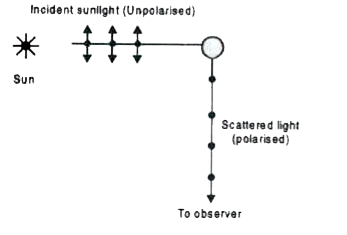Statement -1 : On viewing the clear blue portion of the sky through a calcite crystal, the intensity of transmitted light varies as the crystal is rotated.
Statement -2 : The light coming from the sky is polarized due to scattering of sunlight by particles in the atmosphere.The scattering is largest for blue light.
Statement -1 is true, Statement -2 is false.
Statement -1 is true, statement -2 is true, Statement - 2 is not the correct explanation of Statement - 1.
Statement -1 is true, Statement -2 is true,Statement- 2 is not the correct explanation of Statement -1.
Statement -1 is false, Statement -2 is true.
The correct Answer is:B
The light from a clear blue portion of the sky shows a rise and fall of intensity when viewed through a polaroid which is rotated.

Topper's Solved these Questions
- WAVE OPTICS BOOK - MODERN PUBLICATIONCHAPTER - WAVE OPTICS EXERCISE - Recent Competitive Questions
18 Videos
- WAVE OPTICS BOOK - MODERN PUBLICATIONCHAPTER - WAVE OPTICS EXERCISE - MCQ LEVEL- II (PARAGRAPH QUESTIONS)
28 Videos
- WAVE MOTIONBOOK - MODERN PUBLICATIONCHAPTER - WAVE MOTIONEXERCISE - RECENT COMPETITIVE QUESTIONS
18 Videos
- WORK , POWER , ENERGY AND COLLISIONSBOOK - MODERN PUBLICATIONCHAPTER - WORK , POWER , ENERGY AND COLLISIONSEXERCISE - Revision Test
40 Videos
Similar Questions
Statement-1 : On viewing the clear blue portion of the sky through a Calcite Crystal, the intensity of transmitted light varies as the crystal is rotated.
Statement-2 : The light coming from the sky is polarized due to scattering of sun light by particles in the atmoshphere. The scattering is largest for blue light.
View SolutionThe sky appears blue due to scattering of light.
View Solution
Knowledge Check
Statement-1 : On viewing the clear blue portion of the sky through a Calcite Crystal, the intensity of transmitted light varies as the crystal is rotated.
Statement-2 : The light coming from the sky is polarized due to scattering of sun light by particles in the atmoshphere. The scattering is largest for blue light.AStatement-1 is true, Statement-2 is true.
Statement-2 is correct explanation of Statement-1.BStatement-1 is true, Statement-2 is true, but Statement-2 is not a correct explanation of Statement-1.CStatement-1 is true, Statement-2 is false.DStatement-1 is fasle, Statement-2 is true.Assertion : The blue colour of sky is on account of scattering of sun light.
Reason : The intensity of scattered light varies inversely as the & fourth power of wavelength of the light.AIf both assertion and reason are true and\ reason is a correct explanation of the assertionBIf both assertion and reason are true but the reason is not a correct explanation of assertion.CIf assertion is true but reason is false.DIf assertion is false but reason is trueAssertion (A): The blue colour of the sky is due to Ray light scattering
Reason (R): As light moves through the atmosphere, most of the longer wavelengths pass straight through.AIf (A) and (R) are correct and (R) is the correct explanation of (A)BIf (A) and (R) are correct but (R) is not the correct explanation of (A)CIf (A) is true but (R) is falseDIf (A) is false but (R) is true
The sky appears blue due to scattering of light.
View SolutionWhat do you understand by the statement 'Light from the sun is unpolarised'. Explain how does sunlight gets polarized by the process of scattering?
View SolutionUnpolarized red light is incident on the surface of a lake at incident angle θR. An observer seeing the light reflected from the water surface through a polarizer notices that on rotating the polarizer, the intensity of light drops to zero at a certain orientation. The red light is replaced by unpolarized blue light. The observer sees the same effect with reflected blue light at incident angle θB. Then
View SolutionSTATEMENT -1 : Tyndall effect is due to scattering of light by particles.
and
STATEMENT -2 : Colloidal particles due to charge scatter the light to the maximum extent.
View SolutionSTATEMENT -1 : Tyndall effect is due to scattering of light by particles.
and
STATEMENT -2 : Colloidal particles due to charge scatter the light to the maximum extent.
View Solution
